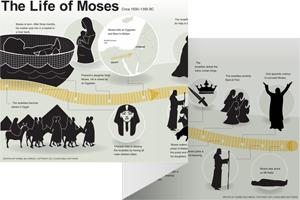63:1 Who is this, coming from Edom, from Bozrah in bright red garments? Who is this honored in his garment, lying down in his great strength? The prophet now sees a vision of Yahweh as the Divine Warrior returning to Zion after vanquishing the nations.
returning to Zion after vanquishing the nations.
in bright red garments Compare the blood-dipped robe of the conquering Christ in Rev 19:13.
63:3 spattered their juice on my garments Compares God’s judgment against people to the trampling of grapes in the winepress. The Hebrew word used here and in Isa 63:6 refers literally to the juice of the trampled grape, and metaphorically to blood. Isaiah’s imagery mixes that of the farmer stained with grape juice from trampling his harvest and that of the warrior returning from battle with blood-stained garments.
63:5 my arm came to assist me See 59:16.
63:8 he became a Savior to them God Himself became Israel’s Savior.
63:9 In all their distress, there was no distress Refers to Yahweh’s empathy in seeing the plight of His people (compare Exod 2:23–25).
the messenger of his presence Echoes Exod 23:20–23 and the symbol of Yahweh’s presence with Israel during the exodus. Allusions to the exodus permeate the imagery of Isa 63:7–14.
63:10 they grieved his Holy Spirit There are few references to the “Holy Spirit” in the ot. Only here is there a hint of His existence as a distinct person with attributes such as the emotion of grief. Compare Paul’s warning against grieving the Holy Spirit in Eph 4:30.
in the ot. Only here is there a hint of His existence as a distinct person with attributes such as the emotion of grief. Compare Paul’s warning against grieving the Holy Spirit in Eph 4:30.
63:11 his people remembered the days of old, of Moses Recalls the events of the book of Exodus.
from the sea Alludes to the crossing of the Red Sea (Exod 14:19–22).
the shepherds of his flock Refers to the leaders of Israel in the exodus—Moses and Aaron. See note on Isa 40:11.
63:12 his magnificent arm A symbol of His power. Compare Exod 6:6; see note on Isa 11:10; note on 11:11.
to make an everlasting name for himself Alludes to Exod 14:21. God’s mighty acts were meant to establish His power and authority in the eyes of Israel and the nations (see Neh 9:10).
63:14 so you lead your people See Num 10:33. The ark symbolizing Yahweh’s presence led the Israelite procession.
63:15 your zeal Compare Isa 59:17, where Yahweh’s zeal motivates His actions as the Divine Warrior.
63:16 Abraham does not know us Abraham would not recognize his own descendants because of how far off the path they’ve wandered from following Yahweh (see Gen 15:6 on Abraham’s faith).

|
About Faithlife Study BibleFaithlife Study Bible (FSB) is your guide to the ancient world of the Old and New Testaments, with study notes and articles that draw from a wide range of academic research. FSB helps you learn how to think about interpretation methods and issues so that you can gain a deeper understanding of the text. |
| Copyright |
Copyright 2012 Logos Bible Software. |
| Support Info | fsb |
 Loading…
Loading…


